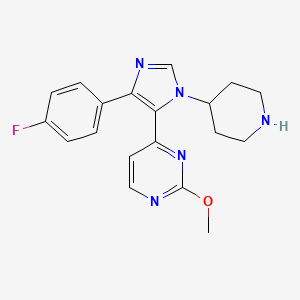m6A-centered Drug Response Information
General Information of the Drug (ID: M6APDG03202)
| Name |
SB-242235
|
||||
|---|---|---|---|---|---|
| Synonyms |
193746-75-7; SB-242235; SB242235; SB 242235; 4-(4-(4-fluorophenyl)-1-(piperidin-4-yl)-1H-imidazol-5-yl)-2-methoxypyrimidine; CHEMBL95692; 4-[5-(4-fluorophenyl)-3-piperidin-4-ylimidazol-4-yl]-2-methoxypyrimidine; 4-[4-(4-fluorophenyl)-1-(piperidin-4-yl)-1H-imidazol-5-yl]-2-methoxypyrimidine; Kinome_3169; SCHEMBL2267209; BDBM15458; SYN1076; PDTYLGXVBIWRIM-UHFFFAOYSA-N; MolPort-028-720-427; HMS3244I18; HMS3244J17; HMS3244I17; EX-A1881; BCP05992; ZINC1487129; 3254AH; RS0056; AKOS027323444; CS-2097; NCGC00345831-01; NCGC00345831-03
Click to Show/Hide
|
||||
| Status |
Discontinued in Phase 1
|
||||
| Structure |
 |
||||
| Formula |
C19H20FN5O
|
||||
| InChI |
1S/C19H20FN5O/c1-26-19-22-11-8-16(24-19)18-17(13-2-4-14(20)5-3-13)23-12-25(18)15-6-9-21-10-7-15/h2-5,8,11-12,15,21H,6-7,9-10H2,1H3
|
||||
| InChIKey |
PDTYLGXVBIWRIM-UHFFFAOYSA-N
|
||||
| PubChem CID | |||||
| TTD Drug ID | |||||
Target Gene(s) and Their Upstream m6A Regulator, Together with the Effect of Target Gene(s) in Drug Response
The target genes involved in drug-target interaction (such as drug-metabolizing enzymes, drug transporters and therapeutic targets) and drug-mediated cell death signaling (including modulating DNA damage and repair capacity, escaping from drug-induced apoptosis, autophagy, cellular metabolic reprogramming, oncogenic bypass signaling, cell microenvironment, cell stemness, etc.) could be regulated by m6A regulator(s) and affected their corresponding drug response. You can browse detailed information on drug-related target gene(s) mediated by m6A regulators.
Heat shock protein beta-1 (HSPB1)
Methyltransferase-like 3 (METTL3)
| In total 1 mechanisms lead to this potential drug response | ||||
| Response Summary | Heat shock protein beta-1 (HSPB1) is a therapeutic target for SB-242235. The Methyltransferase-like 3 (METTL3) has potential in affecting the response of SB-242235 through regulating the expression of Heat shock protein beta-1 (HSPB1). | [1], [2] | ||
YTH domain-containing family protein 2 (YTHDF2)
| In total 1 mechanisms lead to this potential drug response | ||||
| Response Summary | Heat shock protein beta-1 (HSPB1) is a therapeutic target for SB-242235. The YTH domain-containing family protein 2 (YTHDF2) has potential in affecting the response of SB-242235 through regulating the expression of Heat shock protein beta-1 (HSPB1). | [1], [2] | ||
Stress-activated protein kinase 2a (p38 alpha)
Insulin-like growth factor 2 mRNA-binding protein 2 (IGF2BP2)
| In total 1 mechanisms lead to this potential drug response | ||||
| Response Summary | Stress-activated protein kinase 2a (p38 alpha) is a therapeutic target for SB-242235. The Insulin-like growth factor 2 mRNA-binding protein 2 (IGF2BP2) has potential in affecting the response of SB-242235 through regulating the expression of Stress-activated protein kinase 2a (p38 alpha). | [3], [4] | ||
Methyltransferase-like 3 (METTL3)
| In total 1 mechanisms lead to this potential drug response | ||||
| Response Summary | Stress-activated protein kinase 2a (p38 alpha) is a therapeutic target for SB-242235. The Methyltransferase-like 3 (METTL3) has potential in affecting the response of SB-242235 through regulating the expression of Stress-activated protein kinase 2a (p38 alpha). | [4], [5] | ||
YTH domain-containing family protein 3 (YTHDF3)
| In total 1 mechanisms lead to this potential drug response | ||||
| Response Summary | Stress-activated protein kinase 2a (p38 alpha) is a therapeutic target for SB-242235. The YTH domain-containing family protein 3 (YTHDF3) has potential in affecting the response of SB-242235 through regulating the expression of Stress-activated protein kinase 2a (p38 alpha). | [3], [4] | ||
References